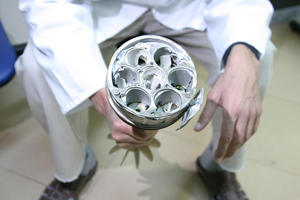
The tail end of a cluster bomb that landed in Misrata / Human Rights Watch
The New York Times is reporting Thursday morning that the Libyan war – launched by Americans with their fingers crossed – will likely have “no quick and easy end.” It’s hard to recall those days in early March when the rebels were on the move and U.S.-led air attacks, later joined by NATO, were viewed as little more than a armed thumb on the scale to tip the war the rebels’ way.
While that might have been true – if the U.S. and NATO attacks had been launched two weeks earlier – by the time they starting bombing forces loyal to Muammar Gaddafi, the Libyan leader had regained the offensive. He had pushed the rebels, disorganized and (obligatory-to-mention) ragtag, back on their heels. The air assaults have done little more than to freeze a stalemate in place, kind of like using Super Glue on shards of broken china that haven’t been put back together properly before the glue sets.
“Some countries thought the Libya operation could be over quickly,” an unidentified senior NATO ambassador tells the Times. “But no military commander thinks so.”
Absent a lucky break — someone pulls out a gun and kills Gaddafi, for example — this could drag on indefinitely, exposing President Obama to political peril as the 2012 election campaign begins, and exposing NATO as feckless. Less than a quarter of the alliance’s 28 nations are carrying out air strikes, led by Britain and France. Gaddafi, knowing the alliance is fraying, has begun using cluster bombs against Misrata, turning the U.N.’s promise to protect civilians into an impotent, cruel joke. Britain, France and Italy are sending perhaps three dozen military trainers to Benghazi to train the rebels. Highlighting the paucity of effort, the U.S. said Wednesday it would provide the rebels with up to $25 million in body armor, medical supplies, and other non-lethal aid. Literally, Band-aids for the sucking chest wound the Libyan war has become.
This all provides no satisfaction to Pentagon officials who warned something like this might happen. Discerning the views of top officials sometimes is a stealthy exercise – you have to read between the lines. But back in early March Pentagon leaders were making it clear they didn’t embrace the idea of a Libyan intervention. “I would note that the U.N. Security Council resolution provides no authorization for the use of armed force,” Gates said Mar. 1. “There is no unanimity within NATO for the use of armed force. And the kinds of options that have been talked about in the press and elsewhere also have their own consequences and second- and third-order effects.” There’s Gates listing three reasons not to get involved.
The nation’s top military leader concurred. “The U.N. resolution currently out there doesn’t authorize any use of force,” Adm. Mike Mullen, chairman of the Joint Chiefs of Staff, said Mar. 2. “It’s an extraordinarily complex operation…I haven’t seen any confirmation where Gaddafi is using this force against his people.” There’s Mullen listing three reasons not to get involved.
But Secretary of State Hillary Clinton and others inside the State Department and White House pushed for military action. “We have joined the Libyan people in demanding that Gaddafi must go now, without further violence or delay. And we are working to translate the world’s outrage into action and results,” she told Congress on Mar. 1. “We are also very conscious of the desire by the Libyan opposition forces that they be seen as doing this by themselves on behalf of the Libyan people, that there not be outside intervention by any external force, because they want this to have been their accomplishment. We respect that.”
It has been seven weeks since those words were spoken.
“Gaddafi must go now?” Hasn’t happened.
“Working to translate the world’s outrage into action and results?” Not yet.
Letting the Libyans do it on their own, because “we respect that?” Well, check off one out of three.


